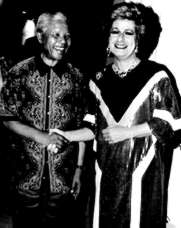![]()
|
South Africa's version of RuPaul takes on politics
in 1999 elections (continued) Part 3 of 4 For a printer-friendly version of this story, click here. |
|||||
| "Nothing
is beyond a joke," Uys said. "The more dangerous, the more important."
Uys said he got very nervous when he read about voter apathy in the papers this year. He decided it was time for Evita to step in, despite the apparent danger of talking politics in areas where political discord had erupted in violence in the past year. In Richmond, where some 80 people were killed in political violence last year, members of the opposing parties sat side by side in the audience, while Evita wagged her finger at them and said, "Stop this nonsense!" "There were some moments before I said things when I thought, 'Must I say this? Am I going to be killed now because of what I am saying?' But they were the best moments in the whole evening, because people out there realized it took courage to say," Uys said. Although Evita's show usually attracts white, urban audiences, Uys found black audiences to be more appreciative of the show. "Black people fell out of their chairs and lay on the floor, screaming with delight. God, it was marvelous! And the white people were clutching their pearls." Many whites did not come, Uys said with amusement, "because it was a free show and they were worried they'd have to sit next to a drunk, black liberator." Uys paid for the traveling show himself with some help from donors. While the National Democracy Institute, the Electoral Institute of South Africa and other non-governmental organizations have sponsored voter education sessions in the past month, international attention and funding has moved to the continent's other fledgling democracies, such as Nigeria and Rwanda. Most of the voter education sessions in South Africa are aimed at young, first-time voters, only 31 percent of whom are registered. "The most difficult part of the population to reach is the young urban voters, people who were 13 during the last elections," said Patricia Keefer, director of the National Democratic Institute. "They haven't seen anything change. They aren't even disillusioned, because they never had a chance to have illusions." |
|
||||


